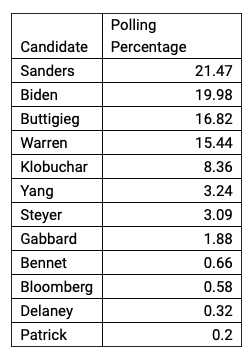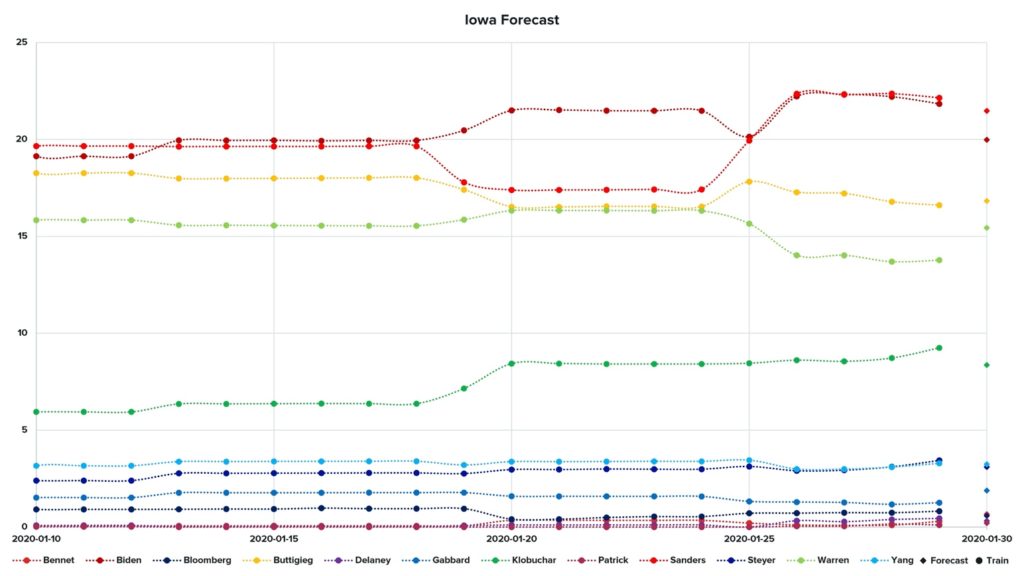Predicting the outcome of the Iowa caucuses is tough, even for the best prognosticators. The caucus process is more demanding of voters’ time and commitment than casting a vote in a primary.
For years, Republicans relied on the Iowa Straw Poll the preceding August to predict a winner, but it was only right half the time and the GOP dumped it in 2015.
Some longtime caucus watchers believe it’s all about the weather: Cold and rain help candidates relying on their party’s passionate base, while good weather brings out more moderate (and often older) voters.
“I don’t know anyone who thinks they can predict the Iowa caucus,” local talk host Simon Conway of WHO radio told InsideSources. “But I do know we have a vomiting hippo who just predicted Kansas City would win the Super Bowl.”
(Conway called back later to correct himself. “It’s a panda, at the Blank Park Zoo in Des Moines. The hippo’s in Cincinnati.”)
But if you ask Kenton White, he’ll tell you to talk to Polly. And Polly says to bet the house on Bernie Sanders, followed by Joe Biden, Pete Buttigieg and Elizabeth Warren — all of whom, she predicts, will break through the 15 percent barrier to win delegates.
Who is Polly? Polly is a creation of Advanced Symbolics Inc. (ASI) where White is the chief scientist. “Polly is the first AI in the world able to predict human behavior up to the minute — everything from buying decisions to voting intentions,” ASI claims, and they offer Polly’s performance in previous elections as proof. From Boris Johnson’s surprising success in December to Trump’s shocking 2016 win, to the 2015 upset victory for Justin Trudeau’s Liberal Party in the Canadian Federal Election, Polly predicted it all.
And now its (‘she’s?’ Can we do pronouns for AI?) predicting that Bernie will win the Iowa caucuses on Monday. And, more surprising, that he’ll have Elizabeth Warren to thank for it.

“When looking at the forecast numbers, the story isn’t between Sanders and Biden (although polls have shown them neck-to-neck for the past few days), but the shift in momentum for Warren,” ASI says. “Polly sees Warren cracking 15 percent of the vote, which is significantly higher than the 13-14 percent polls have been showing. These votes come at the expense of Biden, who will drop to 20 percent for the first time since the Democratic Debate on January 15.”
Nate Silver at the data analysis website FiveThirtyEight also sees a Sanders win, but he’s more modest with his predictions, giving odds rather than a specific outcome.
“Per our model, as of 8 p.m. Wednesday, Sanders had a 37 percent chance of winning the most votes — which is the best in the field. But it also means there’s a 63 percent chance he won’t win. Our model forecasts Biden to win 35 percent of the time, meanwhile, followed by Pete Buttigieg at 16 percent, Elizabeth Warren at 9 percent and Amy Klobuchar at 3 percent. Even Klobuchar isn’t that much of a long shot.”

Courtest ASI
If two progressives come out of Iowa with ‘The Big Mo,’ that could have a major impact on New Hampshire a week later– and beyond. How does Polly know it’s going to happen?
She’s a stalker. A social media stalker.
Polly monitors the social media feeds of a sample of voters in Iowa, about 20,000 people according to White, and “listens” to what they’re talking about on Twitter, Reddit, etc.
“We know how they were talking in the last midterm elections and in 2016, and during elections going back to 2012,” White told InsideSources. “And we know how all those different elections played out, district by district. She built a model, she looks at how people are talking today, and then she makes a prediction.”
White says it’s a double-blind sample — “we don’t pick the people and the people who are in it don’t know they’re in” — and that ASI’s approach is a solution to a growing problem in polling: People don’t want to talk to pollsters, and when they do, you can’t always trust their answers.
“People used to talk on their phones all the time. They talked to friends on their phones and to strangers. Not anymore,” White says. “The conversation has moved online. Our response rates on telephone polls are less than 9 percent now, which is getting to the point where the people who are willing to take phone polls are outliers.”
If relying on AI for your election predictions sounds scary, Zoltan Istvan –a “transhumanist” candidate for president running in the GOP primary this year– tells InsideSources that the future will involve “AI politicians.”
“Within 20 or 30 years, we will have a consciousness that can get out there and debate at least as well our current politicians,” he predicts.
Get ready to vote “President Google” in 2032.

